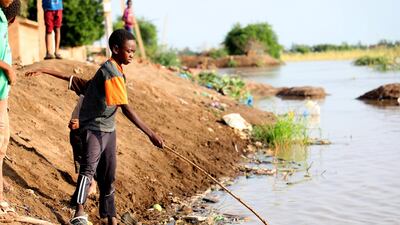Since September, Sudan has suffered devastating floods that have jeopardised livelihoods in a nation struggling with inflation, economic crisis and the coronavirus pandemic. The floods have killed more than 100 Sudanese and damaged 166,000 homes.
For the 3 million people who comprise the country’s farming community, the floods spell catastrophe. According to the UN Food and Agriculture Organisation, nearly a third of cultivated land has been affected. This exacerbates the soaring inflation of the past 18 months, in which the price of food and basic necessities have risen dramatically.
More than half of all young Sudanese now wish to leave the country altogether, according to the recently released 2020 Arab Youth Survey.
The persistent economic hardship has cast a pall over Sudan’s many recent successes. In December 2018, the Sudanese rose up against the government of Omar Al Bashir, who was deposed in April 2019. A power-sharing deal between the military and the civilian protest movement successfully installed a Sovereignty Council while the country prepares for elections in 2022.
Sudan is now in a much stronger position to lobby for its removal from the US' list of state sponsors of terrorism. Khartoum was added to the list in 1993 because the Al Bashir regime harboured extremists. Sanctions have prevented Sudan from accessing the global economy and obtaining loans and debt relief. In the context of inflation and flooding, the burden is even heavier.
But in Khartoum today, reformists are at the helm. The Sudanese government no longer welcomes nor tolerates extremists. Women now have more rights; the Sudanese people enjoy more freedoms and a peace agreement has been signed between the government and separatist factions in the country’s West and South. Last month, Sudan agreed to enact reforms to stabilise its economy as part of a one-year programme monitored by the International Monetary Fund. As a result, the country could have access to much-needed economic relief.
A number of Arab states have stood by Khartoum to help it achieve a successful political transition. Since last April, the UAE and Saudi Arabia have pledged $3 billion to support Sudan’s ailing economy and its people. In the past month, the UAE has also stepped up efforts to help victims of the floods.
Two aircraft carrying 100 tonnes of aid were sent to Sudan from the Emirates this week, in addition to another 100 tonnes of relief sent last month from Dubai Humanitarian City, including medical equipment and food. Saudi Arabia has sent more than 200 tonnes of aid, including food supplies and building materials since September. Egypt has also come to the aid of its neighbour to the south. Cairo has sent several aircraft carrying humanitarian aid in the aftermath of the floods in Sudan.
Maintaining a steady course in these efforts is all the more vital today, as the floods are expected to have long-lasting consequences.
The Sudanese have stood up to injustice and refused extremism and corruption. They are a source of inspiration to the entire region and deserve greater support to rebuild homes, restore damaged crops and save livelihoods.


